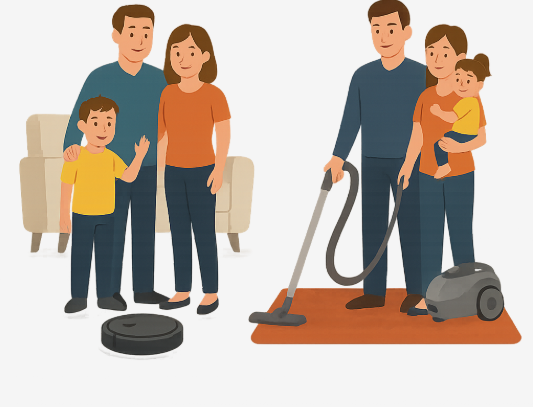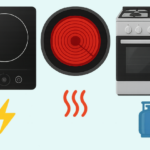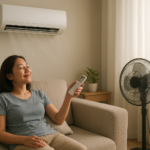In recent years, robotic vacuum cleaners have become a familiar household appliance, partially replacing the role of traditional vacuum cleaners. However, many consumers are unsure: between a regular vacuum cleaner and a robotic one, which is the more cost-effective and energy-efficient choice for cleaning your home?

1. Traditional Vacuum Cleaners: High Power, Quick Cleaning
Traditional vacuum cleaners operate with high-power motors, creating strong suction to clean dirt and dust quickly.
- Power Consumption: 1,000–2,000 watts.
- Cleaning Time: Approximately 20–30 minutes for a 70–80 square meter apartment.
- Electricity Consumption: About 0.5–1 kilowatt-hour per cleaning session, costing around 2,000–3,500 VND.
- Advantages: Fast cleaning, strong suction, capable of handling large debris or thick carpets.
- Disadvantages: Noisy, require physical effort, not suitable for daily use.
2. Robotic Vacuum Cleaners: Lower Power Consumption, Longer Running Time
Robotic vacuum cleaners use smaller, lower-power motors combined with brushes and sensors to navigate and clean automatically.
- Power Consumption: 30–60 watts.
- Cleaning Time: 1–2 hours for a 70–80 square meter apartment.
- Electricity Consumption: Approximately 0.05–0.1 kilowatt-hour per cleaning session, costing only 200–400 VND.
- Advantages: Automated, time and energy-saving, can be used daily to maintain a clean home.
- Disadvantages: Weaker suction, struggle with large debris or thick carpets, require periodic maintenance (brush replacement, filter cleaning).
3. Comparing Electricity Costs
- Traditional Vacuum Cleaners: A family using it 2–3 times per week will consume 4–12 kilowatt-hours per month, costing around 15,000–40,000 VND.
- Robotic Vacuum Cleaners: Daily use will consume about 1.5–3 kilowatt-hours per month, costing only 5,000–10,000 VND.
Thus, when it comes to electricity consumption, robotic vacuum cleaners are significantly more cost-effective, with expenses being just a quarter to a fifth of that of traditional vacuum cleaners.
4. Convenience and Cleaning Efficiency
While robots are more energy-efficient, cleaning effectiveness depends on specific needs:
- Small homes with less dirt and a daily cleaning routine: Robotic vacuum cleaners save energy and maintain a clean space without effort.
- Larger homes with thick carpets and heavy dirt: Traditional vacuum cleaners are more efficient, despite higher electricity costs.
Combined Solution: Many families now opt for robotic vacuum cleaners for daily maintenance and use traditional vacuum cleaners for deeper weekly cleaning.
While robotic vacuum cleaners excel in energy efficiency due to their lower power consumption and frugal operation, traditional vacuum cleaners remain irreplaceable for those who require strong suction and thorough cleaning.
In the context of rising electricity costs, a combined solution of using both robotic and traditional vacuum cleaners will optimize costs while ensuring effective home cleaning.
The Green Rush: Bamboo Capital Stocks Soar as Investors Pile In
The August 29 session witnessed a breakthrough rally, attracting strong cash flow from investors to the group of Baboo Capital-affiliated stocks: BCG, TCD, BGE, and BCR.
“Smart Tips to Save Energy with Your Microwave and Oven.”
In a world where the cost of living is soaring, these habits are not just about saving money, but also about embracing a more efficient and sustainable approach to energy usage.










































